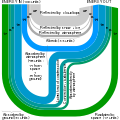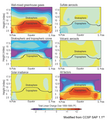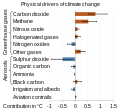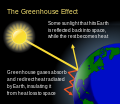The Climate Change Portal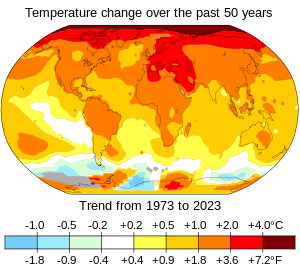 In common usage, climate change describes global warming—the ongoing increase in global average temperature—and its effects on Earth's climate system. Climate change in a broader sense also includes previous long-term changes to Earth's climate. The current rise in global average temperature is primarily caused by humans burning fossil fuels. Fossil fuel use, deforestation, and some agricultural and industrial practices add to greenhouse gases, notably carbon dioxide and methane. Greenhouse gases absorb some of the heat that the Earth radiates after it warms from sunlight. Larger amounts of these gases trap more heat in Earth's lower atmosphere, causing global warming. Climate change has an increasingly large impact on the environment. Deserts are expanding, while heat waves and wildfires are becoming more common. Amplified warming in the Arctic has contributed to thawing permafrost, retreat of glaciers and sea ice decline. Higher temperatures are also causing more intense storms, droughts, and other weather extremes. Rapid environmental change in mountains, coral reefs, and the Arctic is forcing many species to relocate or become extinct. Even if efforts to minimise future warming are successful, some effects will continue for centuries. These include ocean heating, ocean acidification and sea level rise. Climate change threatens people with increased flooding, extreme heat, increased food and water scarcity, more disease, and economic loss. Human migration and conflict can also be a result. The World Health Organization (WHO) calls climate change the greatest threat to global health in the 21st century. Societies and ecosystems will experience more severe risks without action to limit warming. Adapting to climate change through efforts like flood control measures or drought-resistant crops partially reduces climate change risks, although some limits to adaptation have already been reached. Poorer communities are responsible for a small share of global emissions, yet have the least ability to adapt and are most vulnerable to climate change. Many climate change impacts have been felt in recent years, with 2023 the warmest on record at +1.48 °C (2.66 °F) since regular tracking began in 1850. Additional warming will increase these impacts and can trigger tipping points, such as melting all of the Greenland ice sheet. Under the 2015 Paris Agreement, nations collectively agreed to keep warming "well under 2 °C". However, with pledges made under the Agreement, global warming would still reach about 2.7 °C (4.9 °F) by the end of the century. Limiting warming to 1.5 °C will require halving emissions by 2030 and achieving net-zero emissions by 2050. Fossil fuel use can be phased out by conserving energy and switching to energy sources that do not produce significant carbon pollution. These energy sources include wind, solar, hydro, and nuclear power. Cleanly generated electricity can replace fossil fuels for powering transportation, heating buildings, and running industrial processes. Carbon can also be removed from the atmosphere, for instance by increasing forest cover and farming with methods that capture carbon in soil. ( Full article...) Selected article –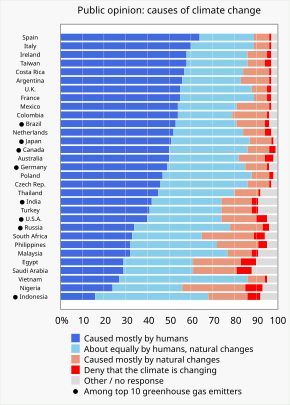 Public opinion on climate change is related to a broad set of variables, including the effects of sociodemographic, political, cultural, economic, and environmental factors as well as media coverage and interaction with different news and social media. International public opinion on climate change shows a majority viewing the crisis as an emergency. Public opinion polling is an important part of studying climate communication and how to improve climate action, evidence of public opinion can help increase commitment to act by decision makers. Surveys and polling to assess opinion have been done since the 1980s, first focusing on awareness, but gradually including greater detail about commitments to climate action. More recently, global surveys give much finer data, for example, in January 2021, the United Nations Development Programme published the results of The Peoples' Climate Vote. This was the largest-ever climate survey, with responses from 1.2 million people in 50 countries, which indicated that 64% of respondents considered climate change to be an emergency, with forest and land conservation being the most popular solutions. ( Full article...)Selected picture –Global
vegetation – Food, fuel and shelter. Vegetation is one of the most important requirements for human populations around the world. Satellites monitor how "green" different parts of the planet are and how that greenness changes over time. These observations help scientists understand the influence of natural cycles, such as
drought and
pest outbreaks, on vegetation, as well as human influences, such as land-clearing and
global warming.
WikiProjectsIn the newsAdditional News
Selected biography –Carol Martha Browner (born December 16, 1955) is an American lawyer, environmentalist, and businesswoman, who served as director of the White House Office of Energy and Climate Change Policy in the Obama administration from 2009 to 2011. Browner previously served as Administrator of the Environmental Protection Agency (EPA) during the Clinton administration from 1993 to 2001. She currently works as a Senior Counselor at Albright Stonebridge Group, a global business strategy firm. Browner grew up in Florida and graduated from the University of Florida and the University of Florida College of Law. After working for the Florida House of Representatives, she was employed by Citizen Action in Washington, D.C. She became a legislative assistant for Senators Lawton Chiles and Al Gore. Browner then headed the Florida Department of Environmental Regulation from 1991 to 1993, where she turned it into one of the most active departments in the state government. She was the longest-serving administrator in the history of the EPA, staying through both terms of the Clinton presidency. During her tenure, she reorganized the agency's enforcement structure and oversaw two new programs designed to create flexible partnerships with industry as an alternative to traditional regulation. She started a successful program to deal with contaminated lands in urban areas. She took the lead within the administration in defending existing environmental laws and budgets and was the driving force behind a stringent tightening of air quality standards that led to a prolonged political and legal battle. ( Full article...)General imagesThe following are images from various climate-related articles on Wikipedia.
Did you know –Related portalsSelected panorama –Credit:
NASA Multimedia This video summarizes how
climate change, associated with increased
carbon dioxide levels, has affected
plant growth.
Topics
CategoriesWeb resources
Things to do
WikimediaReferences
Discover Wikipedia using
portals |
The Climate Change Portal In common usage, climate change describes global warming—the ongoing increase in global average temperature—and its effects on Earth's climate system. Climate change in a broader sense also includes previous long-term changes to Earth's climate. The current rise in global average temperature is primarily caused by humans burning fossil fuels. Fossil fuel use, deforestation, and some agricultural and industrial practices add to greenhouse gases, notably carbon dioxide and methane. Greenhouse gases absorb some of the heat that the Earth radiates after it warms from sunlight. Larger amounts of these gases trap more heat in Earth's lower atmosphere, causing global warming. Climate change has an increasingly large impact on the environment. Deserts are expanding, while heat waves and wildfires are becoming more common. Amplified warming in the Arctic has contributed to thawing permafrost, retreat of glaciers and sea ice decline. Higher temperatures are also causing more intense storms, droughts, and other weather extremes. Rapid environmental change in mountains, coral reefs, and the Arctic is forcing many species to relocate or become extinct. Even if efforts to minimise future warming are successful, some effects will continue for centuries. These include ocean heating, ocean acidification and sea level rise. Climate change threatens people with increased flooding, extreme heat, increased food and water scarcity, more disease, and economic loss. Human migration and conflict can also be a result. The World Health Organization (WHO) calls climate change the greatest threat to global health in the 21st century. Societies and ecosystems will experience more severe risks without action to limit warming. Adapting to climate change through efforts like flood control measures or drought-resistant crops partially reduces climate change risks, although some limits to adaptation have already been reached. Poorer communities are responsible for a small share of global emissions, yet have the least ability to adapt and are most vulnerable to climate change. Many climate change impacts have been felt in recent years, with 2023 the warmest on record at +1.48 °C (2.66 °F) since regular tracking began in 1850. Additional warming will increase these impacts and can trigger tipping points, such as melting all of the Greenland ice sheet. Under the 2015 Paris Agreement, nations collectively agreed to keep warming "well under 2 °C". However, with pledges made under the Agreement, global warming would still reach about 2.7 °C (4.9 °F) by the end of the century. Limiting warming to 1.5 °C will require halving emissions by 2030 and achieving net-zero emissions by 2050. Fossil fuel use can be phased out by conserving energy and switching to energy sources that do not produce significant carbon pollution. These energy sources include wind, solar, hydro, and nuclear power. Cleanly generated electricity can replace fossil fuels for powering transportation, heating buildings, and running industrial processes. Carbon can also be removed from the atmosphere, for instance by increasing forest cover and farming with methods that capture carbon in soil. ( Full article...) Selected article – Public opinion on climate change is related to a broad set of variables, including the effects of sociodemographic, political, cultural, economic, and environmental factors as well as media coverage and interaction with different news and social media. International public opinion on climate change shows a majority viewing the crisis as an emergency. Public opinion polling is an important part of studying climate communication and how to improve climate action, evidence of public opinion can help increase commitment to act by decision makers. Surveys and polling to assess opinion have been done since the 1980s, first focusing on awareness, but gradually including greater detail about commitments to climate action. More recently, global surveys give much finer data, for example, in January 2021, the United Nations Development Programme published the results of The Peoples' Climate Vote. This was the largest-ever climate survey, with responses from 1.2 million people in 50 countries, which indicated that 64% of respondents considered climate change to be an emergency, with forest and land conservation being the most popular solutions. ( Full article...)Selected picture –Global
vegetation – Food, fuel and shelter. Vegetation is one of the most important requirements for human populations around the world. Satellites monitor how "green" different parts of the planet are and how that greenness changes over time. These observations help scientists understand the influence of natural cycles, such as
drought and
pest outbreaks, on vegetation, as well as human influences, such as land-clearing and
global warming.
WikiProjectsIn the newsAdditional News
Selected biography –Carol Martha Browner (born December 16, 1955) is an American lawyer, environmentalist, and businesswoman, who served as director of the White House Office of Energy and Climate Change Policy in the Obama administration from 2009 to 2011. Browner previously served as Administrator of the Environmental Protection Agency (EPA) during the Clinton administration from 1993 to 2001. She currently works as a Senior Counselor at Albright Stonebridge Group, a global business strategy firm. Browner grew up in Florida and graduated from the University of Florida and the University of Florida College of Law. After working for the Florida House of Representatives, she was employed by Citizen Action in Washington, D.C. She became a legislative assistant for Senators Lawton Chiles and Al Gore. Browner then headed the Florida Department of Environmental Regulation from 1991 to 1993, where she turned it into one of the most active departments in the state government. She was the longest-serving administrator in the history of the EPA, staying through both terms of the Clinton presidency. During her tenure, she reorganized the agency's enforcement structure and oversaw two new programs designed to create flexible partnerships with industry as an alternative to traditional regulation. She started a successful program to deal with contaminated lands in urban areas. She took the lead within the administration in defending existing environmental laws and budgets and was the driving force behind a stringent tightening of air quality standards that led to a prolonged political and legal battle. ( Full article...)General imagesThe following are images from various climate-related articles on Wikipedia.
Did you know –Related portalsSelected panorama –Credit:
NASA Multimedia This video summarizes how
climate change, associated with increased
carbon dioxide levels, has affected
plant growth.
Topics
CategoriesWeb resources
Things to do
WikimediaReferences
Discover Wikipedia using
portals |









